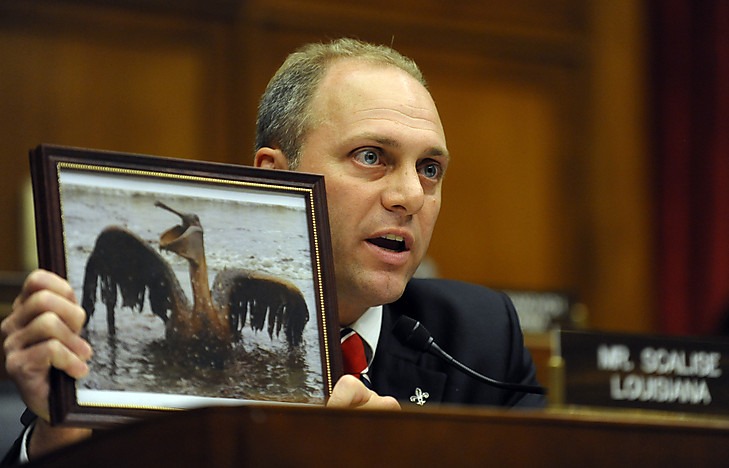(Steve Scalise | Source: Washington Post)
Like much of the legislation passed by the U.S. House of Representatives, the “Regulations from the Executive in Need of Scrutiny Act” falls into the “full of sound and fury, signifying nothing” category. Passed by 232-183 as Congress adjourned for its summer recess in August, the act is a grab bag of restrictions on regulations intended to mitigate climate change.
It requires, for example, congressional approval of any executive agency rule that will result in costs higher than $50 million, targeting Environmental Protection Agency authority to regulate greenhouse gases. That authority was upheld by the Supreme Court six years ago, so congressional Republicans opposed to EPA greenhouse-gas regulation are working in a confined space.
Also included in the bill is an amendment by Louisiana Republican Rep. Steve Scalise, which prohibits the president from pursuing a carbon tax. After the Scalise Amendment passed 237-176, with 12 Democrats joining Republicans voting for it, Scalise declared the carbon tax dead.
|
A concern for the Koch Brothers House Caucus is a growing minority of pragmatic voices in the GOP that are supporting carbon-tax legislation.
|
None of this will become law, of course. In fact, most of what is enacted in the House can be categorized as will-of-the House resolutions, even if members act as if they are passing laws. This Congress has passed only 22 bills since January of this year.
Congressman Scalise’s office did not return my calls inquiring about how the president could “impose” a carbon tax, although to climate-science deniers like Scalise the administration’s decision in June to double the social cost of carbon (SCC) from $21-per-ton might look like a carbon tax. Or worse.
Though technical and largely ignored by the public, adjusting the SCC is real reform, which could be larger than it appears. The liberal Center for American Progress points to factors in the current regulatory framework that could increase the SCC as much as 100 percent, with each increment increasing the economic justification for the amount of carbon that can be mitigated by EPA rules.
The Obama administration’s conclusion that it will get nothing out of this Congress and therefore will use executive authority to reduce carbon emissions has pushed Congressional Republicans around the bend. One response is the “Regulations from the Executive in Need of Scrutiny Act.”
Another concern for the Koch Brothers House Caucus is a growing minority of pragmatic voices in the party that are supporting carbon-tax legislation.
Harvard economics professor Gregory Mankiw, who was an advisor to George W. Bush, describes the carbon-tax bill introduced by Democratic Rep. Henry Waxman and Democratic Sen. Sheldon Whitehouse as “more effective and less invasive than the regulatory approach that the federal government has traditionally pursued.”
Republicans like Mankiw propose a deal with the devil. By imposing taxes on units or carbon emissions, the Waxman-Whitehouse carbon tax bill (and there are others, all sponsored by Democrats) could raise $12 billion over 10 years, while lowering carbon emissions. Pragmatic Republicans like Mankiw would concede greenhouse-gas reduction to the Democrats, as long as any revenue generated would be used to reduce personal and corporate income tax rates.
Mankiw, who made his case a New York Times op-ed, is not a solitary voice. Eli Lehrer, president of the Republican think tank R Street, made a similar argument in The Weekly Standard, although Lehrer argues that the revenue could be used to “replace some or all taxes on capital gains, corporate income, or personal income.”
Once the discussion was expanded to include the reduction or elimination of taxes paid by the top 10 percent, even supply-side economist Arthur Laffer and American Enterprise Fellow Kevin Hassett suddenly became carbon-tax advocates.
No one expects carbon-tax legislation to pass next month. And Koch-funded advocacy groups like the Heritage Foundation, the Manhattan Institute, and Heartland will continue to fight it.
But if Obama’s decision to use his executive authority to reduce greenhouse gases has made the Congressional crazies crazier, it has made pragmatic Republicans more pragmatic.
Lou Dubose is the editor of The Washington Spectator.






